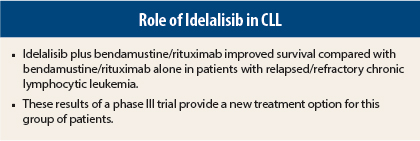Idelalisib (Zydelig) combined with bendamustine (Bendeka, Treanda) plus rituximab (Rituxan) was superior to chemotherapy with bendamustine/rituximab plus placebo, reducing the risk of progressive disease and death while improving progression-free survival and overall survival in patients with relapsed/refractory chronic lymphocytic leukemia (CLL).
These results of a phase III trial were presented at a late-breaking session at the 2015 American Society of Hematology (ASH) Annual Meeting and Exposition,1 adding to other good news for CLL patients presented at this meeting.
“For the first time, we may be able to talk about curative stragtegies for CLL with combinations of new therapies. Idelalisib is one of these therapies and is an important option over the current standard of care,” said Andrew D. Zelenetz, MD, PhD, Vice Chair of Medical Informatics in the Department of Medicine at Memorial Sloan Kettering Cancer Center, New York.
Idelalisib is a first-in-class PIK3 inhibitor approved in combination with rituximab for the treatment of patients with relapsed CLL and as first-line treatment in patients with 17p deletion or TP53 mutation who are unsuitable for chemotherapy.
Study Details
The study randomly assigned 416 patients with relapsed/refractory CLL in a 1:1 fashion to receive idelalisib plus bendamustine/rituximab or placebo plus bendamustine/rituximab. Patients were stratified according to 17p deletion and TP53 mutation status, as well as IGHV mutation status. At baseline, 76% of patients were male, and 58% were under age 65. High-risk features included del(17p)/TP53 mutations (39%), unmutated IGHV (83.2%), and Rai stage III/IV (46%). About 30% were refractory, and patients had received a median of two prior therapies.
A prespecified interim analysis found that progression-free survival (the primary endpoint) and overall survival (a secondary endpoint) were superior in the idelalisib arm. An independent data monitoring committee recommended unblinding the study based on “overwhelming efficacy.”
Key Outcomes Data
For the primary endpoint of progression-free survival, idelalisib achieved a highly statistically significant gain: 23.1 vs 11.1 months, respectively (P < .0001), representing a 67% reduction in risk of progression or death. The progression-free survival benefit was consistent across all subgroups, regardless of mutational status.
Median overall survival has not yet been reached in either arm, but at the time of the ASH meeting, it appeared that idelalisib was 45% more likely to achieve a survival benefit than bendamustine/rituximab alone (P = .008). This benefit was also observed across all subgroups.
Overall response rate was significantly higher in the idelalisib arm: 68% vs 45%. Dr. Zelenetz said that the complete response rate was low, because there weren’t enough confirmatory biopsies to determine the actual complete response rate.
Safety Profile
Both arms of the study were associated with toxicity, but serious adverse events were more common in the idelalisib arm. More treatment discontinuations were reported in the idelalisib arm.
The most common all-grade adverse events in the idelalisib arm were neutropenia and pyrexia: 63.3%, vs 41.5% in the placebo-plus-bendamustine/rituximab arm. The most common adverse events in the bendamustine/rituximab arm were neutropenia and nausea: 53.6%, vs 34.4% in the idelalisib arm.
The most common grade 3 and higher adverse events were neutropenia (59%) and febrile neutropenia (20.3%) in the idelalisib arm and neutropenia (45.9%) and anemia (12%) in the bendamustine/rituximab arm. Grade 3 and higher diarrhea, pneumonitis, and elevations in transaminase levels were all more frequent in the idelalisib arm.
Side effects of concern with idelalisib included elevations in liver enzymes and resultant hepatotoxicity. The rate of all grades of elevated alanine aminotransferase (ALT) was 59.9% in the idelalisib arm vs 30.6% in the bendamustine/rituximab arm; grade 3 or higher ALT elevations were 21.3% vs 2.9%, respectively. Aspartate aminotransferase (AST) levels were also more elevated in the idelalisib arm: all grades, 52.2% vs 27.8%, respectively; grade 3 and higher elevated AST levels were seen in 15.5% vs 3.3%, respectively. ■
Disclosure: Dr. Zelenetz has received research funding from Gilead Sciences.
Reference
1. Zelenetz A, Robak T, Coiffier B, et al: Idelalisib plus bendamustine and rituximab (BR) is superior to BR alone in patients with relapsed/refractory chronic lymphocytic leukemia. 2015 ASH Annual Meeting. Abstract LBA-5. Presented December 8, 2015.



